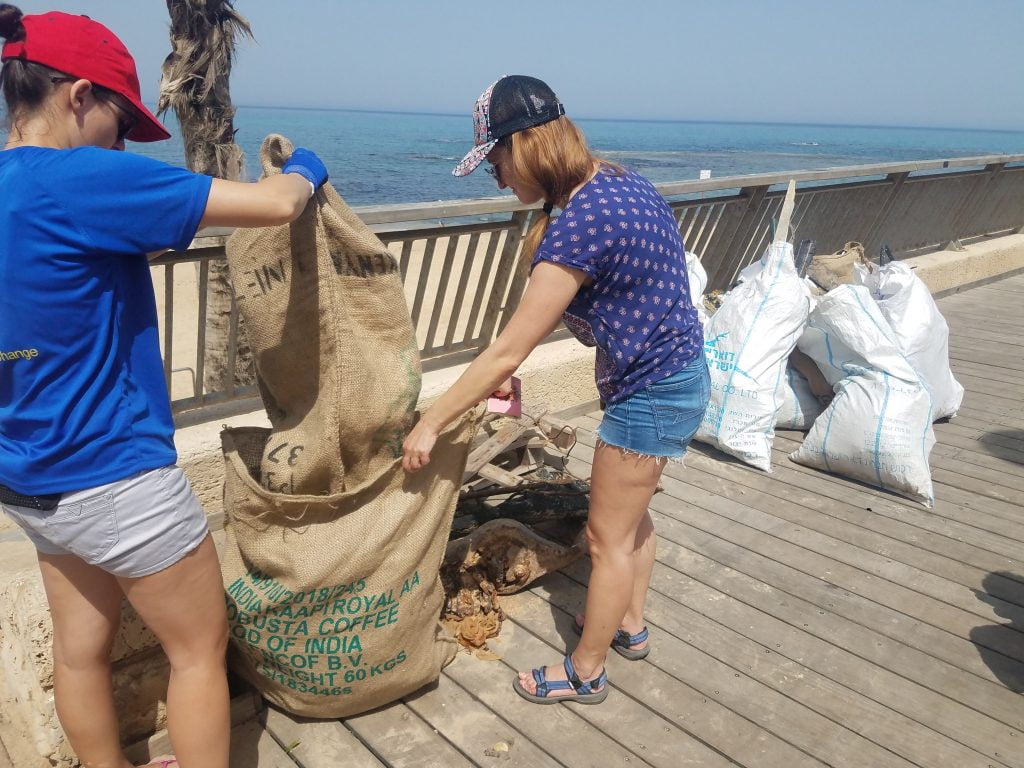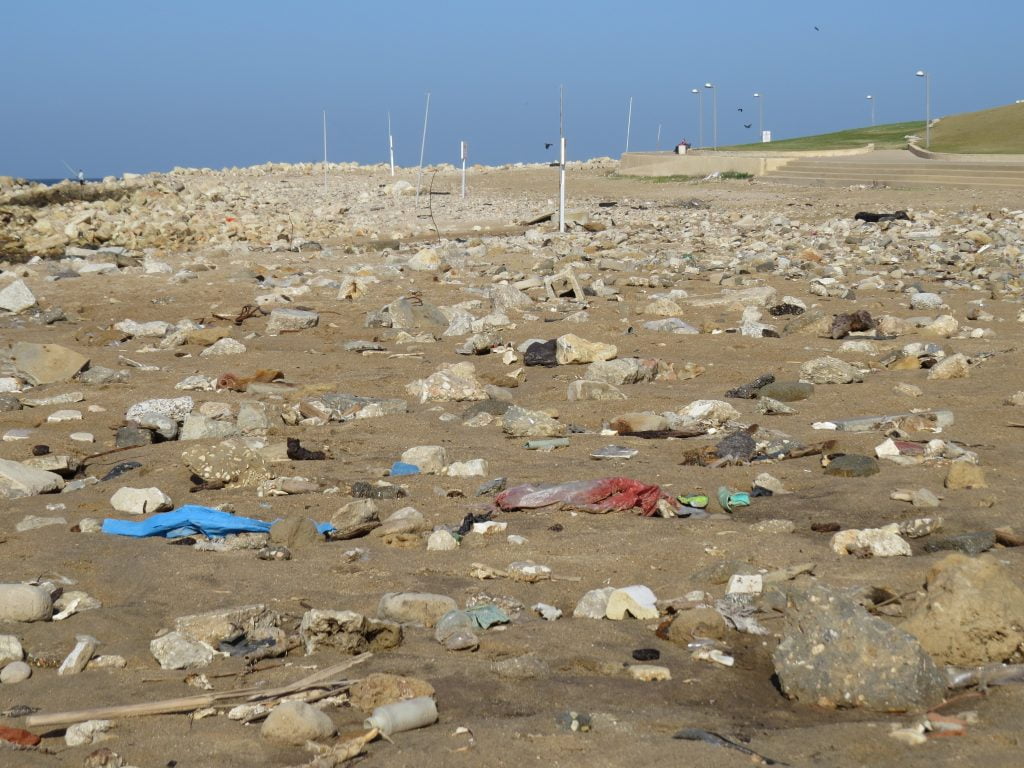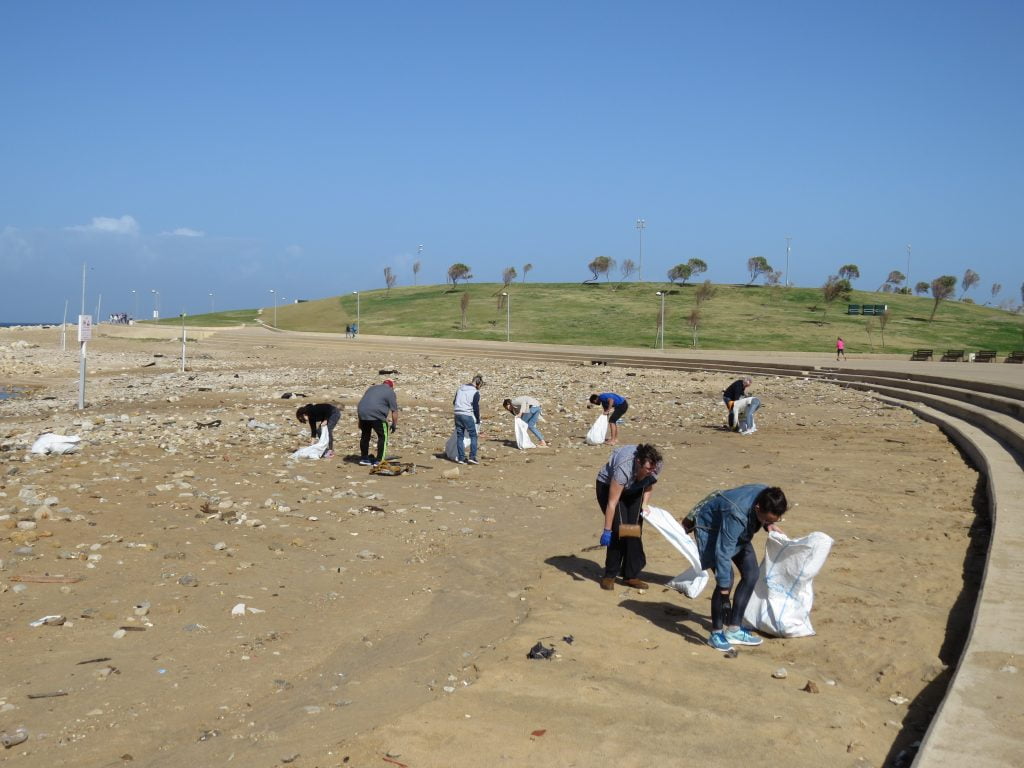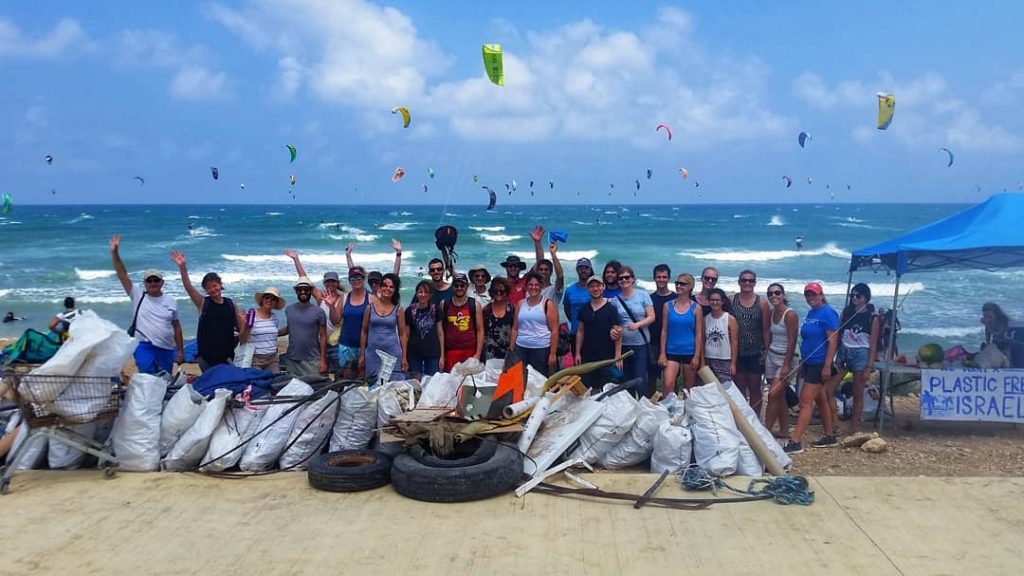This article was written for NoCamels by ZAVIT – Science and Environment in Israel.
When Stav Friedman, a microplastics researcher, moved to Israel in January 2018, she immediately began noticing the copious amounts of litter, particularly plastic, left on beaches. Disturbed by the sight, she began searching for a beach cleanup operation or an environmental group she could work with, but largely came up empty.
That’s when she decided to take matters into her own hands.
“It took me about two months to organize my own cleanup, which was in March of 2018. I advertised it on Facebook and Instagram. In the end, 12 people showed up,” recalls Friedman, an American-born research assistant at the Medical Research Council Centre for Environment and Health’s Microplastics Lab at King’s College London’s School of Population Health & Environmental Sciences.
Friedman is currently completing her dissertation focused on airborne microplastics as part of her MSc in Climate Change: Environment, Science and Policy at King’s.
SEE ALSO: Israel May Finally Be Starting To Turn The Tide On Its Single-Use Plastic Problem
While it seems like a small group, it was the starting point for Plastic Free Israel, Friedman’s grassroots organization promoting a plastic-free existence (or at least on with minimal plastic consumption).

At the beach cleanup, Friedman met like-minded people from environmental organizations across Israel who helped her establish the group. Plastic Free Israel has evolved into a grassroots movement with monthly beach cleanups at different locations around Tel Aviv, campaigns focusing on how to reduce plastic, and seminars and panels on environmental issues including plastic waste.
The problem is plastic
According to Plastic Free Israel, plastic production is at an all-time high, with more plastic produced in the last ten years than in the previous century. Between 22 and 43 percent of plastic worldwide is disposed of in landfills instead of being recycled properly, and about 10 million metric tons of plastic enter the oceans each year. An estimated 5.25 trillion plastic particles weighing 268,940 tons are currently floating in the oceans. This affects over 700 marine species. Even the plastic packaging we use has the potential to leach into the food and water we consume if exposed to extreme heat or if the plastic is deformed, worn out, or of low-grade quality.
Each year, more than 320 million tons of plastic are produced worldwide. Plastic production has is expected to keep increasing by 4 percent each year for the coming years.
In Israel, wet wipes, single-use plastics, and cigarette butts are a major problem and are seen everywhere.

“We had a clean-up at Gordon beach and picked up over 15,000 cigarette butts in less than an hour,” Freidman says.
Plastic Free Israel holds cleanups at least once a month, she explains, “sometimes more if there are enough volunteers or other groups with which we’re collaborating.”
Microplastics are everywhere
As part of her research, Friedman looks at the effects of microplastics and their effects on our natural environment. Microplastics are formed when plastics are broken down into small pieces due to prolonged exposure to the elements. These fragments (usually between 5 mm to a few micrometers) are ubiquitous; they are found in the ice sheets of the Arctic Ocean and even on distant mountaintops of the French Pyrenees.
Microplastics have found their way into our daily lives as well. The water we drink, dust, and even in products we eat, including table salt, sea salt, beer, and honey contain microplastics. One 2019 study found that the average person consumed on average 50,000 microplastic particles a year.
They are also added to products such as shower gels and toothpaste and eventually make their way into the sewer systems, after which they flow into the ocean.
Coffee cup campaign
Sign up for our free weekly newsletter
SubscribeAs consumers, Plastic Free Israel feels we have the power to speak up and change the way that the government views plastics, how schools consume plastics, and how businesses and industries produce plastics.
As part of its efforts, Plastic Free Israel started a coffee campaign in Tel Aviv with the goal of reducing the number of disposable coffee cups used by consumers. Single-use coffee cups are made of paper but are also lined with polyethylene. This combination of paper and plastic makes it very hard to recycle, and so people generally don’t.
Plastic Free Israel has partnered with a number of local coffee shops that will offer discounts to people who bring their own reusable cups.

“People need to get more comfortable with reusing materials instead of disposing of them. It is hard in Israel because people love their to-go cups,” says Friedman. She put a research team together that reached out to different coffee shops to discuss incentivizing those who bring their own cups. “This kind of campaign is effective in western countries, and now, there has been momentum here,” she adds.
Through social media, this campaign has grown, and more people and companies have gotten involved. Plastic Free Israel hopes to have this campaign reach the big coffee shop networks in Israel.
Slow it down – tips for living a plastic-free life
“I like the idea of slowing down. Sit down and have a cup of coffee. Don’t ask for it to go. Have it in a real mug and enjoy that over a paper cup,” suggests Friedman. “Such simple little changes can develop into a nice lifestyle. Make food at home and bring it in a non-plastic lunchbox. Bring cutlery and a water bottle. Remember those things and to slow down a little bit. It’s a really great and satisfying way of life,” she adds.
Another way to reduce plastic pollution (and pollution in general) is probably the most simple thing one can do. If you see trash, pick it up. According to Plastic Free Israel, “picking up a few pieces here or there is one step towards making a difference. We are all role models for the people around us!”
The organization’s Sustainable Baby Steps blog gives a list of plastic products that can be replaced by reusable ones. Some examples include using a keyboard made out of bamboo, stainless steel cooking utensils, and wooden toothbrushes.
How to get involved
Plastic Free Israel’s beach cleanups are slowly growing and attracting more people. “Sometimes, we have over 100 people during our collaborative beach-cleanups, where we partner with different school groups and organizations. We’ve even partnered with the European Union,” says Friedman
So far, Plastic Free Israel has had 19 beach cleanups with over 900 volunteers, removing 5,500 kilograms of trash from Israel’s coastline. The organization has over 11,000 followers on Facebook and posts regularly about monthly beach cleanups and other events.
SEE ALSO: Could Jellyfish Help Rid Our Waters Of Plastic Waste? Israeli Scientists Are On It
The organization is entirely volunteer-based. “For the moment, we’re completely non-funded and run everything based on physical donations (trash bags, gloves, sustainable gifts that we raffle off to cleanup attendees) and the incredible volunteers that put so much time into running the page, building content, creating relationships and engaging with the community – they’re really the core of what we do,” explains Friedman.
She describes Plastic Free Israel as an “incredibly passionate group” that is “deeply moved by the good and terrible things happening to our natural environment; that’s what drives us to run PFI.”
The organization is divided into volunteer teams “like the content and social media management teams, or the cleanup team, or the education team.” Friedman says that since a lot of the events and campaigns are based on volunteer availability, Plastic Free Israel is always looking for more people. (Those interested can reach out to Friedman via email on Plastic Free Israel’s contact page, or via DMs on Facebook and Instagram.)
“It is an amazing movement, and I am so happy to see it grow,” Friedman says.
Related posts

Rehabilitation Nation: Israeli Innovation On Road To Healing

Israeli High-Tech Sector 'Still Good' Despite Year Of War





Facebook comments